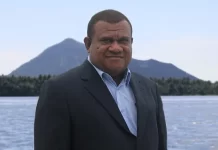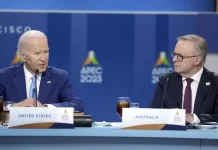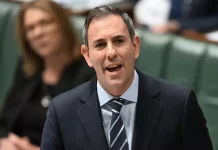The Quad will build undersea cable systems and fund infrastructure development and telecommunications across the Asia Pacific in an expansion of its remit designed to blunt China’s growing influence in the region.
The announcement by Prime Minister Anthony Albanese, Japanese Prime Minister Fumio Kishida, Indian Prime Minister Narendra Modi and U.S President Joe Biden was coupled with a pledge to put south-east Asian nations and the Pacific Islands at the centre of its plans after a campaign by Beijing to paint the four nations as elite and out of touch with developing countries.
In a 3000-word statement that did not mention China, the four leaders took aim at its growing authoritarianism, Beijing’s pursuit of territorial claims in the South and East China seas, and economic intimidation.
“Our vision is for a region that is peaceful and prosperous, stable and secure, and respectful of sovereignty – free from intimidation and coercion, and where disputes are settled in accordance with international law,” the leaders said.
“Conscious that ours must not be an era of war, we remain committed to dialogue and diplomacy.”
In his opening remarks, Kishida said the war in Ukraine showed the international security environment had become even more severe. “The open international order based on the law is under threat,” he said.
The Quad, which began as a response to the 2004 tsunami and has transformed into a security grouping that surrounds China geographically and has prompted regional scepticism for its expansion of US power, said it would respect the leadership of the Association of Southeast Asian Nations, Pacific Islands Forum and the Indian Ocean Rim Association.
China’s foreign ministry has described the Quad as “a tool to contain and circle China, and preserve America’s hegemony”,
But the four leaders were careful not to directly name Beijing on Saturday night in Hiroshima and did not respond to questions about whether concerns about China’s rise were driving decisions.
The investments will fund 1800 positions for infrastructure development to design and build and manage infrastructure across the Asia-Pacific, a strengthening of undersea cable networks and deployment of an Open Radio Access Network with Palau.
China has poured billions of dollars in investment into infrastructure across the region, including in the Solomon Islands, where it is building the facilities for this year’s Pacific Island Games. In 2019, Australia blocked Chinese telecommunication giant Huawei from building a high-speed undersea internet cable for the Pacific. Last year, the Australian government funded a $1.3 billion (US$863 million) Telstra buyout of Pacific mobile network Digicel to prevent it from being snapped up by a Chinese-state-owned carrier.
“The Quad is committed to ensuring regional countries are not left behind as telecommunications markets and network architectures evolve,” the four leaders said.
Saturday’s meeting was rescheduled after Biden was forced to abandon his trip to Australia for the original summit due to the U.S debt ceiling crisis. The original summit in Sydney was scheduled to take place over a full day on Wednesday at the Opera House. The meeting in Hiroshima on the sidelines of the G7 lasted less than an hour.
Albanese, this year’s Quad chair, said it showed the group could be flexible. “It’s an example of our resolve,” he said.
Biden said he expected the network to have an impact on the world for decades.
“Many people are going to look back on the Quad, God willing, in 10, 20, 30 years from now and say you changed the dynamic not only in the region but of the world,” he said.
Modi confirmed next year’s Quad would not be rescheduled in Sydney.
“India looks forward to hosting the next Quad in 2024,” he said. “We are moving forward with a constructive agenda based on shared democratic values,” he said.
SOURCE: SMH/PACNEWS















